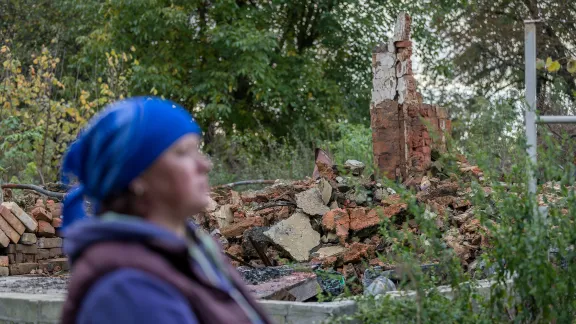
A Ukrainian mother stands beside the remains of her home in the village of Bil’machivka, north of Ichnya in Chernihiv Oblast, after it was destroyed by Russian military forces in the spring of 2022. Photo: LWF/A. Hillert
LWF and partners deliver statement decrying “unspeakable human suffering” and call for increased humanitarian funds
(LWI) - “Indiscriminate attacks on civilians and humanitarian workers, the bombing of schools and hospitals and the use of starvation and sexual violence as methods of warfare are devastating communities worldwide.” That is the stark warning contained in a statement delivered by The Lutheran World Federation (LWF) and over 100 other partner organizations, including an appeal to “turn the tide together in 2025.”
The 4 December statement says the world is witnessing “unspeakable human suffering due to the proliferation of conflicts lacking political solutions and the normalization of International Humanitarian Law (IHL) violations.” It notes that “climate shocks and economic fragility” are further exacerbating humanitarian needs, leading to “unprecedented levels of displacement and an escalating global hunger crisis.”
Nothing will reduce humanitarian needs unless civilians are protected.
Statement delivered by LWF and partners
The statement urges donors to fully fund the 2025 Global Humanitarian Overview, warning that many vulnerable people are at risk as “funding lags behind and Overseas Development Aid cuts impact both humanitarian action and development gains.” In particular, the signatories call for a “re-commitment to the traditionally underfunded sectors of gender and gender-based violence, education and child protection in emergencies.”
Noting that this year marked the 75th anniversary of the Geneva Conventions, upon which International Humanitarian Law is based, the statement says violations must end now and “the consistent application of IHL” must be a top priority. “Nothing will reduce humanitarian needs unless civilians are protected,” it insists.
The statement calls for “a substantial increase in the volume and quality to local and national actors, including women’s organizations, whose essential leadership in humanitarian response must be recognized.” It also urges all stakeholders to “redouble efforts to prevent and resolve conflict,” insisting that “we must turn the tide together in 2025.”


